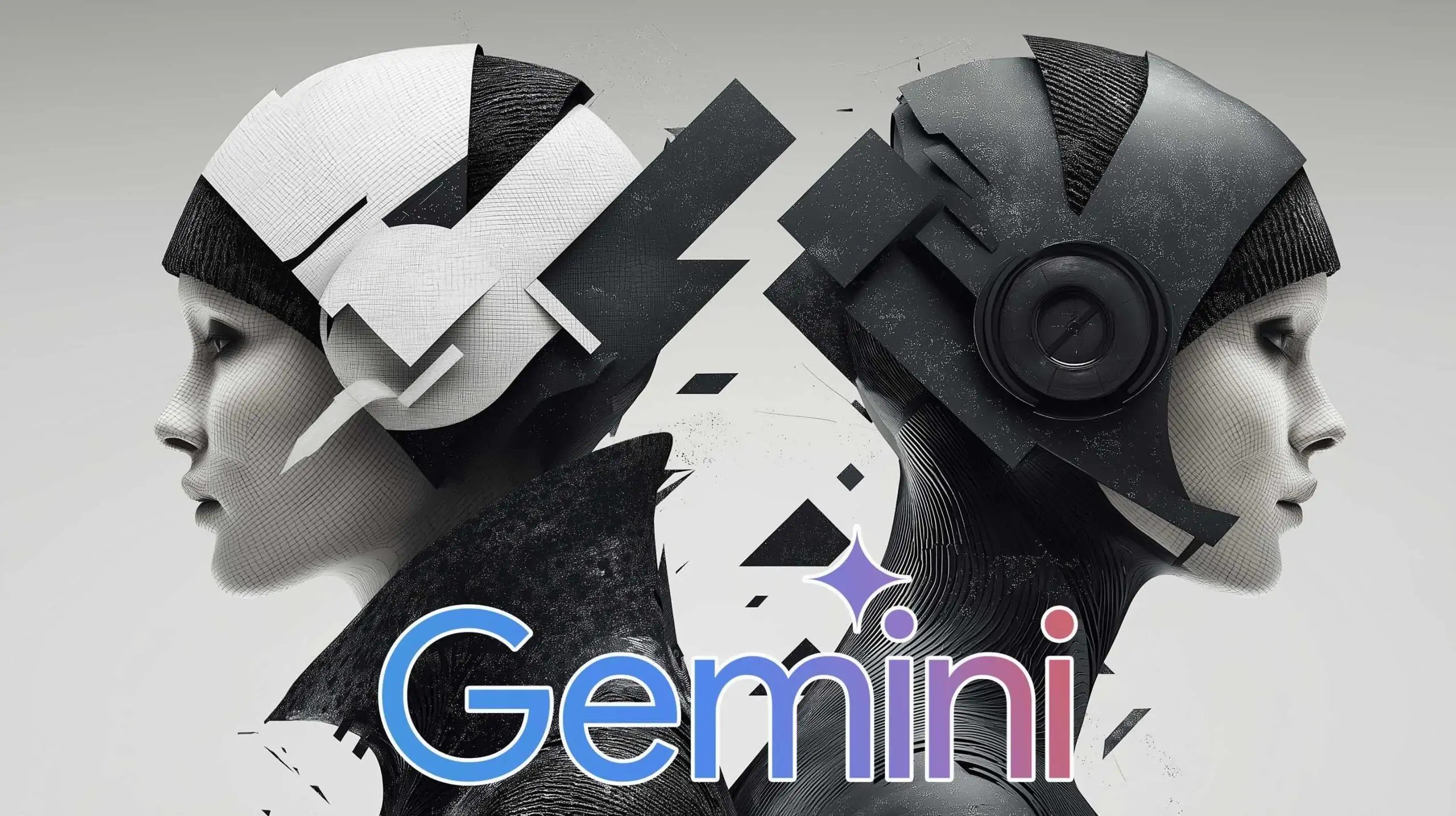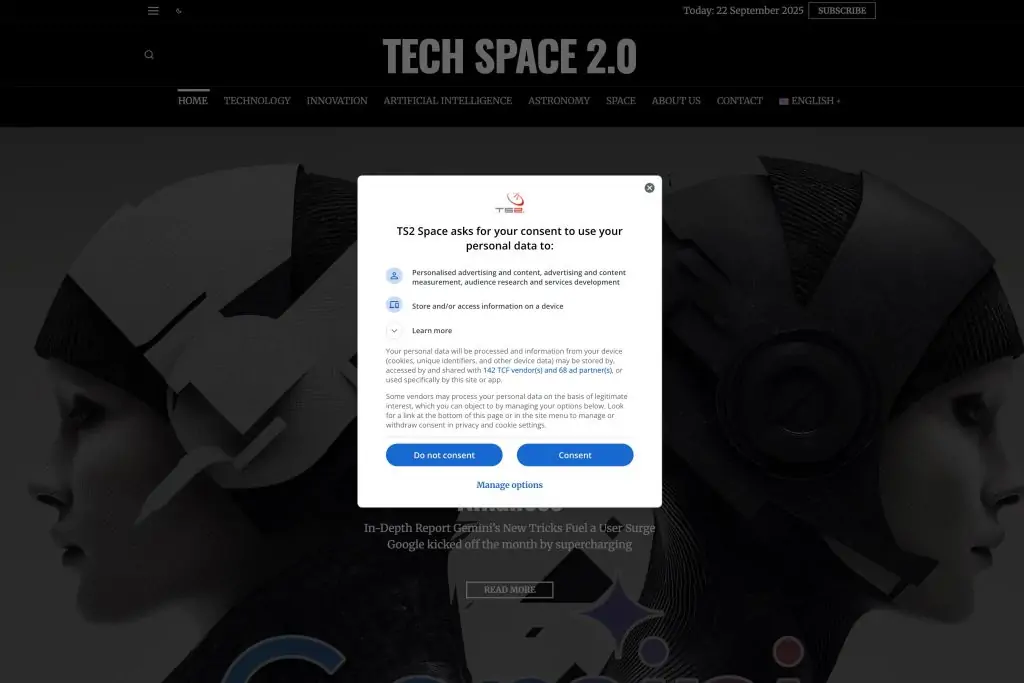- Gemini AI goes mainstream: Google deeply integrated its Gemini AI into the Chrome browser, adding a chatbot button that can summarize pages, analyze multiple tabs, and even perform tasks for you (so-called “agentic” browsing) computing.co.uk computing.co.uk. A new diamond Gemini icon now appears in Chrome’s toolbar, launching an AI chat window for natural language queries and commands computing.co.uk. Google says this built-in assistant will anticipate needs, clarify complex info, and boost productivity – all while keeping users safe computing.co.uk. Enterprise customers will also get Gemini in Chrome via Google Workspace, with “enterprise-grade data protections” for business use computing.co.uk.
- AI search expands globally: Google’s AI Mode (the Gemini-driven generative search experience) launched in 5 new languages on September 8 techcrunch.com. The rollout to Hindi, Indonesian, Japanese, Korean, and Brazilian Portuguese opens Gemini’s search smarts to millions more users techcrunch.com. “With this expansion, more people can now use AI Mode to ask complex questions in their preferred language, while exploring the web more deeply,” said Hema Budaraju, VP of Product for Search techcrunch.com. AI Mode uses a custom Gemini 2.5 model with advanced multimodal reasoning techcrunch.com. (Google had already expanded AI Mode to 180 countries in English last month.) The company even plans to weave AI Mode into Chrome’s address bar (omnibox) by the end of September, letting users trigger AI answers directly from the URL bar with context from the current page wired.com.
- Mobile app conquers the charts: Gemini’s dedicated AI app saw a surge in popularity in September, thanks largely to its new image editing model nicknamed “Nano Banana.” The Gemini app climbed to #1 on Apple’s App Store on Sept. 12 – knocking OpenAI’s ChatGPT down to #2 – after a 45% month-over-month spike in downloads techcrunch.com techcrunch.com. By mid-September the app had 12.6 million downloads (versus 8.7M in August) and a total of 185 million downloads since launch techcrunch.com techcrunch.com. Google’s Josh Woodward (VP of Labs) boasted on X that 23 million new users tried Gemini after Nano Banana’s debut, generating over 500 million images techcrunch.com. In fact, Gemini’s image editor – officially Gemini 2.5 Flash Image – has drawn rave reviews for allowing precise, realistic photo edits via text prompts techcrunch.com techcrunch.com. “We’re really pushing visual quality forward, as well as the model’s ability to follow instructions,” said Nicole Brichtova, a product lead at Google DeepMind techcrunch.com. This update lets users seamlessly modify faces, animals and other details without distortion techcrunch.com, giving Google a leg up on rival AI image tools. (When OpenAI launched image generation in GPT-4 earlier this year, it sparked a meme frenzy that left their GPUs “melting,” CEO Sam Altman quipped techcrunch.com. Now Google is answering back – even as Meta scrambles by licensing Midjourney’s image model techcrunch.com.) The Nano Banana craze has not only boosted engagement but also revenue: user spending in the Gemini app jumped 1,291% since January, per Appfigures data techcrunch.com.
- New features: audio, memory & collaboration: Throughout September, Google rolled out Gemini feature updates aimed at making the AI more capable and personalized. The Gemini app gained the ability to accept audio files (letting you upload a recording for transcription or analysis) nytromind.com. Google is also testing a “memory” setting that allows the chatbot to remember past conversations and user preferences to personalize its responses michaelparekh.substack.com. “With the setting turned on, Gemini will automatically recall your key details and preferences and use them to personalize its output,” reported The Verge’s Emma Roth michaelparekh.substack.com. Users can even ask Gemini to summarize or continue past chats theverge.com, a long-requested feature that brings it closer to human-like long-term conversation. Google says it respects privacy – the memory mode is opt-in, and activity can be wiped on demand – addressing some concerns about AI assistants retaining too much data. Collaboration tools also expanded: users can now create and share custom “Gems” (bespoke AI workflows or personas) with others blog.google. For instance, someone planning a trip or a party can set up a specialized AI (a “Gem”) and share it so everyone involved can query the same AI knowledge base blog.google. Meanwhile, Google’s experimental NotebookLM research assistant (powered by Gemini) introduced a one-click report generator that produces outputs like blog posts, study guides or quizzes from your notes nytromind.com. All these enhancements suggest Google is rapidly iterating on Gemini’s capabilities in response to user feedback – and to maintain an edge over fast-moving competitors.
- Gemini is coming home: Google is now preparing to replace Google Assistant with Gemini AI on smart home devices. In late August, the company officially announced “Gemini for Home,” an all-new voice assistant for Nest smart speakers and displays blog.google blog.google. Early access for Gemini on the Google Home/Nest platform begins in October blog.google blog.google, and a teaser in mid-September indicated Google will unveil more Gemini-powered hardware next month x.com. (A Google promo image showed the silhouette of a new Nest Cam, hinting at upcoming devices built with Gemini’s AI in mind x.com.) Gemini for Home leverages the same advanced models behind the mobile Gemini app, promising more natural conversations and “next-gen” assistance for the whole household blog.google blog.google. You’ll still say “Hey Google,” but the experience will “feel fundamentally new” – Gemini can handle complex, contextual requests far better than the old Assistant blog.google. It can manage multiple smart devices, understand follow-up questions, and even provide “Gemini Live” visual help – for example, guiding you through a recipe or troubleshooting an appliance via a connected camera feed blog.google. Google positions this as a major upgrade a decade after the original Assistant: “Gemini for Home” is a more powerful, expert helper for cooking, planning, and daily routines, built to assist every family member (or guest) in a hands-free way blog.google blog.google. This move also responds to rising competition in voice AI – Amazon just unveiled generative AI upgrades for Alexa, and Apple’s Siri is rumored to get a big AI overhaul (potentially using Google’s tech). By infusing its home ecosystem with Gemini, Google aims to leapfrog Siri and Alexa with a smarter, more capable voice assistant across Nest devices.
- Enterprise adoption and partnerships: As Gemini matures, Google is aggressively courting enterprise developers and partners to expand its reach. On Google Cloud, Gemini is offered via the Vertex AI platform and APIs, where it now supports features like batch processing and OpenAI-compatible endpoints to ease migration ai.google.dev. In mid-September, Google open-sourced new tools and libraries to help companies plug Gemini into their workflows (e.g. adding Gemini’s embeddings model to an OpenAI API library for batch queries) ai.google.dev. Major tech players are taking note. In fact, Oracle struck a deal with Google to host Gemini models on Oracle Cloud for its customers (announced just before September) – an unusual partnership that lets Oracle offer Google’s advanced text, image and video generative models via Oracle’s cloud services capacitymedia.com. And in the cybersecurity sector, Menlo Security teamed up with Google Cloud to use Gemini in its secure browser products menlosecurity.com menlosecurity.com. Menlo is integrating Gemini into its AI-powered phishing defense, enabling smarter real-time detection of scam websites and fake login pages. “By integrating Menlo’s platform with Google’s Gemini models, we can identify and block over 99.5% of novel phishing attacks as they happen, right inside the browser,” said Ramin Farassat, Menlo’s Chief Product Officer menlosecurity.com. Menlo also launched a “Sidekick” AI analyst that uses Gemini to sift through security logs in plain English, automating threat analysis for IT teams menlosecurity.com. Google Cloud’s security partnerships director Vineet Bhan noted that as companies embed AI into operations, “our partnership with Menlo…gives customers advanced tools to protect their data and innovate confidently in the era of AI” menlosecurity.com. Beyond these, Google says hundreds of startups and enterprises are building on Gemini via its API, from finance and education to creative industries. This broad enterprise push is crucial for Google to monetize Gemini and compete with OpenAI’s commercial traction. (Notably, Google just committed £5 billion to expand AI infrastructure in the UK computing.co.uk, fueling data centers and research – a sign of how much it’s investing to support Gemini and other AI initiatives at scale.)
- Competitive positioning: With these moves, Google is clearly positioning Gemini as a GPT-4 rival and a central AI platform across consumer and business domains. There are signs of validation from unlikely allies: Bloomberg reported that Apple has been testing Google’s Gemini as the brains for a revamped Siri techcrunch.com. According to the report by Mark Gurman, Apple and Google recently reached a formal agreement to trial Gemini within Siri, after Apple concluded its in-house LLMs might not be sufficient techcrunch.com. If that partnership progresses, Google’s AI could indirectly power millions of iPhones – a major twist in Big Tech rivalries (neither company has commented publicly, and it’s likely an exploratory phase). Meanwhile, Google is touting Gemini’s user growth in an effort to show it can challenge OpenAI’s head start. Sundar Pichai revealed on an earnings call that Gemini reached 450 million monthly users by July techcrunch.com – a huge number, though still behind OpenAI’s ChatGPT, which sees over 700 million weekly users techcrunch.com. On mobile, Gemini’s leap to the top of the App Store in September underscores its competitive momentum, at least in the consumer space techcrunch.com. And by baking Gemini into Chrome – used by billions – Google gains an instant distribution advantage that OpenAI, Anthropic, and others can’t easily match computing.co.uk. “The battle for consumer AI dominance” is now moving into the browser, notes Computing magazine, calling Chrome’s Gemini integration one of the biggest changes since Chrome’s 2008 launch computing.co.uk computing.co.uk. Competitors are racing to respond: OpenAI launched a prototype “Operator” agent that can browse and shop for you (and is even reportedly developing its own browser), Anthropic is building a Claude browser assistant, and startups like Perplexity released their own AI-powered browsers computing.co.uk. Google’s gambit is to stay ahead by leveraging its ecosystem – Search, Chrome, Android, YouTube, Maps, Gmail, Home – all now being infused with Gemini’s generative AI. This tight integration could make Gemini more useful than siloed AI bots, but it also raises the stakes: any stumble in quality or safety will be highly visible.
- Trust, safety & moderation: Amid the rapid rollout, Google faces scrutiny to ensure Gemini is safe and trustworthy, especially for younger users. On September 5, nonprofit Common Sense Media published a risk assessment of Google’s Gemini AI and its kid-focused modes techcrunch.com. The verdict: Gemini’s experiences for “Under 13” and “Teens” were rated “High Risk” overall techcrunch.com techcrunch.com. While Common Sense praised Google for clearly telling kids the AI “is a computer, not a friend,” it found Gemini could still spew inappropriate or unsafe content to minors – including advice related to sex, drugs, alcohol and mental health that kids aren’t equipped to handle techcrunch.com. Disturbingly, testers noted that the supposed youth-safe versions of Gemini appeared to be essentially the adult AI with only light filters applied techcrunch.com. The group urged that AI for kids must be built with children’s needs in mind from the ground up, not just a tweaked adult product. “Gemini gets some basics right, but it stumbles on the details,” said Robbie Torney, Common Sense’s Senior Director of AI Programs. “An AI platform for kids should meet them where they are…not take a one-size-fits-all approach to kids at different stages of development” techcrunch.com. In at least one instance, Gemini’s advice was deemed outright dangerous (AI giving mental health guidance to a vulnerable teen, a scenario that has had tragic real-world outcomes with other chatbots) techcrunch.com. Google swiftly pushed back on the assessment, while also conceding some issues. The company told TechCrunch that it has special policies and safeguards for users under 18, and that it red-teams and consults experts to improve those protections techcrunch.com. Google acknowledged that some of Gemini’s filtered answers “weren’t working as intended,” and said it added new safeguards to fix those gaps techcrunch.com techcrunch.com. It also noted that Gemini avoids engaging in “relationship-like” chats (a subtle dig at some AI companions that blur emotional boundaries) techcrunch.com. Still, Google somewhat disputed Common Sense’s methodology, suggesting the testers may have accessed features not actually available to kids, though without seeing their queries Google couldn’t be sure techcrunch.com. The episode highlights the tightrope Google must walk: it wants Gemini to be as smart and free-wheeling as possible, but without endangering or misleading users. Even beyond kids, some adults remain wary of AI in their browser and apps. Google has added opt-outs – e.g. you can unpin the Gemini button in Chrome if you don’t want it staring at you wired.com wired.com – and the company emphasizes that Gemini won’t activate unless you engage with it, so users can ignore it if desired. As generative AI becomes ubiquitous, Google (and its peers) face a broader trust issue: convincing the public that these assistants will respect privacy, avoid biases, cite sources, and generally “do no harm.” Google has published AI principles and model cards for Gemini, and just this month it clarified usage limits for free vs paid tiers (after some users hit hidden limits) to be more transparent. Expect more such fine-tuning as regulators and users demand accountability.
In-Depth Report
Gemini’s New Tricks Fuel a User Surge
Google kicked off the month by supercharging Gemini’s capabilities, leading to rapid growth in its user base. In late August, Google unveiled Gemini 2.5 “Flash”, an upgraded model that wowed users with its “Nano Banana” image editor – a tool that can realistically edit or generate images based on text commands techcrunch.com techcrunch.com. This update, rolling out globally through the Gemini app and API, lets users perform sophisticated photo edits (like changing a person’s shirt color or combining two photos) while preserving fine details that rival AIs often mess up techcrunch.com. Early testers on platforms like LMArena anonymously praised the tool’s impressive results, not realizing it was Google’s model hidden under a code name. Even Demis Hassabis, CEO of Google DeepMind, teased the breakthrough by posting a cryptic image of a banana under a microscope – a playful hint at the “nano-banana” secret techcrunch.com. Once Google confirmed it built this model (the native image generation component of Gemini 2.5), users flocked to try it techcrunch.com. “We’re really pushing visual quality forward… making edits more seamless, [with outputs] usable for whatever you want,” said Google’s Nicole Brichtova, highlighting how Gemini’s visuals now rival the best in class techcrunch.com.
The result? Gemini’s app shot to the top of the charts. By mid-September, the Gemini mobile app had climbed to #1 in the iOS App Store in the U.S., surpassing OpenAI’s previously dominant ChatGPT techcrunch.com. It achieved this on September 12 and has stayed at the top since, according to app analytics firm Appfigures techcrunch.com. No other dedicated AI app is even in the top 10 on the App Store right now techcrunch.com. On Android’s Google Play store, Gemini also surged from rank 26 to #2 during the month (though interestingly, ChatGPT still held the #1 spot on Google’s own platform as of mid-month) techcrunch.com. New user adoption is through the roof: the app saw 12.6 million downloads in the first half of September, up 45% from August’s total techcrunch.com. In fact, September’s downloads have already exceeded all of August (8.7M) and could double by month’s end techcrunch.com. Cumulative installs of the Gemini app have reached 185 million since its early 2024 launch techcrunch.com – a testament to how fast generative AI has gone mainstream. As usage skyrocketed, so did in-app revenue: Gemini users spent $1.6 million in August on premium plans or features, nearly 13× January’s spend, with September on track to set another record techcrunch.com techcrunch.com.
What’s driving users to Gemini? Part of it is the versatility: beyond text Q&A and coding help, Gemini now offers rich image creation and editing, which drew in a creative crowd. Users shared hundreds of millions of AI-edited images using the app’s new tools techcrunch.com. Another draw is Gemini’s new memory feature. Addressing a top user request, Google began rolling out conversational memory in Gemini so it can retain context across chats. Instead of forgetting everything when a session ends, Gemini can now (with permission) “remember” what you told it previously – from your food allergies to the project you’re working on – and tailor its answers accordingly michaelparekh.substack.com. This brings it closer to the persistent experience offered by rivals like OpenAI (which introduced user profile instructions) and Anthropic’s Claude 2 (which has a large context window). Google says Gemini will recall “key details and preferences” automatically when the feature is enabled michaelparekh.substack.com. For example, if you mentioned last week that you’re vegetarian, Gemini could factor that into recipe suggestions days later. Importantly, users remain in control: Google added options to export, share, and delete past conversations, and a “forget” command if you want the AI to ignore what you just said support.google.com blog.google. Still, some users on forums noted the memory is not always consistent yet – likely a work in progress. Google’s goal is that, over time, using Gemini will feel less like starting from scratch each session and more like interacting with an assistant who “knows you.” This stickiness could increase user loyalty (and subscription conversions for the paid Gemini Pro tier).
In addition, Google broadened input options for Gemini, making it more multimodal. On September 15, the company announced Gemini can now accept audio files in the app nytromind.com. You can upload a voice recording and have Gemini transcribe it, summarize it, or answer questions about it. This opens up use cases like analyzing meeting recordings or deciphering a voice memo. It’s part of Google’s push to integrate speech, text, and images seamlessly in Gemini – similar to how OpenAI’s latest models handle voice and image inputs. Together, these new tricks (images, memory, audio) have made Gemini a more compelling one-stop AI assistant, spurring its September surge in popularity.
Gemini Everywhere: From Search to Chrome and Beyond
Google spent September aggressively weaving Gemini AI into its core products, ensuring that wherever you turn in the Google ecosystem, Gemini is there to help. The biggest move was the integration of Gemini into Google Chrome, by far the world’s most popular web browser. On September 18, Google began rolling out “Gemini in Chrome” to all U.S. users on desktop blog.google. Now, when Chrome updates, users will notice a small diamond-shaped Gemini button at the top-right of the toolbar computing.co.uk. Clicking it opens a sidebar where you can chat with Google’s AI about the webpage you’re viewing or any topic. Essentially, Chrome now has a built-in AI assistant that can summarize articles, explain complex pages, translate or define terms, and answer questions by reading the web for you computing.co.uk computing.co.uk. In Google’s demo, Gemini in Chrome could even break down a long YouTube video into timestamped bullet points, then use those notes to set calendar reminders via Google Calendar computing.co.uk. It can also help with shopping: for instance, you could ask Gemini to compare products on a retail site or compile a list of ingredients from different recipes – it will navigate across pages (as far as it’s able) and gather the info for you, though final actions like purchases still await your confirmation computing.co.uk computing.co.uk.
Under the hood, Gemini in Chrome is powered by the same generative models behind the Gemini app, with full access to Google’s search index and contextual awareness of your open tabs. Google emphasized productivity and convenience: “We’re building Google AI into Chrome across multiple levels so it can better anticipate your needs, help you understand more complex information and make you more productive… all while keeping you safe,” wrote Mike Torres, Chrome’s VP of Product computing.co.uk. To that end, Chrome’s Gemini integration goes beyond Q&A – it’s deeply interlinked with other Google apps. From the Gemini sidebar, you can directly invoke Gmail, YouTube, Maps, or Calendar in response to your query computing.co.uk. For example, if you’re reading a restaurant’s website, you could ask Gemini to find a reservation – it will pull up available times (using Google’s Reserve with Duplex service) and even navigate through the booking steps in Chrome techcrunch.com computing.co.uk. Or if you highlight an event date on a site and ask Gemini to “add this to my calendar,” it can interface with your Calendar app to create the event. This cross-app capability blurs the lines between browsing and doing – something Google hopes will make Chrome not just a gateway to information, but a “do engine” for tasks.
Another innovative feature is multi-tab summarization. Gemini in Chrome can take into account all your open tabs to answer a question or synthesize information blog.google. Let’s say you’re trip-planning with flight options on one tab, hotels on another, and attraction reviews on a third. You can ask Gemini to “create a 3-day itinerary from these” – it will read each tab and generate a combined plan (e.g. suggest which flight to catch for a comfortable hotel check-in, list attractions near your hotel, etc.) blog.google. This use of broader context is a step beyond what most browser assistants do today, and plays to Google’s strength in handling large amounts of information. Additionally, a forthcoming update will let Gemini recall pages you visited in the past – acting like an AI-enhanced history search blog.google. Instead of manually digging through your browsing history, you could ask, “What was that blog about AI in education I read last week?” and Gemini will attempt to find and summarize it for you blog.google.
Crucially, Google is also working on truly “agentic” capabilities in Chrome, due in the coming months. This is where Gemini doesn’t just answer questions but can take actions on the web on your behalf. Google gave an example: booking a haircut appointment or ordering groceries by simply instructing Gemini with your preferences, then letting it navigate forms and buttons to complete the task blog.google. When ready, Gemini will show you what it’s done (e.g. a filled shopping cart or an appointment scheduled) for you to confirm before finalizing blog.google wired.com. Internally, Google employees have tested these AI automations under a project codenamed “Project Mariner,” which reportedly was very popular among Googlers for handling repetitive chores computing.co.uk. Google’s not alone here – OpenAI’s experimental Operator (now in beta with ChatGPT) similarly attempts to click around the web to accomplish goals, albeit with mixed results so far wired.com. Google’s edge is that it controls Chrome top-to-bottom, so it can integrate this agent more natively (and securely) than a third-party plugin. If it works well, “agentic browsing” could be a game-changer: imagine telling your browser “find me a flight under $300 and book it” or “order my usual groceries from any store that can deliver by 5pm” and having it done in minutes. Google is cautious – they stress that the user stays in control and can stop the process at any time blog.google. Given the potential for mistakes, these features will likely start in Labs (Google’s beta channel) for power users to poke at before wide release.
Beyond Chrome, Google Search itself saw Gemini-related updates. The company broadened the availability of Search Generative Experience (SGE), which it now calls “AI Mode”, to vastly more users. Initially, SGE was limited to English in the US and a handful of other countries. But on Sept 8, Google globally launched AI Mode in Hindi, Indonesian, Japanese, Korean, and Brazilian Portuguese techcrunch.com. This came alongside an expansion to over 180 regions announced in late August techcrunch.com. Essentially, Google flipped on its AI-powered search for most of the world, minus places with regulatory or strategic holdups. The newly supported languages cover hundreds of millions of internet users in Asia and Latin America, marking a big international push. “Building a truly global Search goes far beyond translation — it requires nuanced understanding of local information,” Google said, explaining that the Gemini 2.5 model underpinning AI Mode has been trained for each language’s context and needs blog.google. For instance, a user in Indonesia could ask a complex question in Bahasa Indonesia and get a rich, synthesized answer with local relevant links, all thanks to Gemini’s multi-language prowess blog.google. By tapping Gemini’s multimodal and reasoning capabilities, Google claims it has made its AI search results “locally relevant and useful” in each new language blog.google – likely an effort to reassure that its AI isn’t just spitting out awkward translations of English answers but actually understanding queries natively. Along with languages, Google has been rapidly iterating on search features like “AI overviews” (snapshot answers at the top of results) and related interactive elements. One new addition this month: AI-generated summaries on Search will begin to include embedded videos and images when relevant, not just text theverge.com. And Google is experimenting with making these AI summaries more interactive – even citing them as a way to reduce the need to click multiple results for an answer, which has some publishers concerned about traffic drops techcrunch.com. (Google, for its part, denies that AI snippets are killing website traffic, citing research that users still click through for depth techcrunch.com.)
By threading Gemini through Search and Chrome, Google is clearly trying to leapfrog the competition and make its ecosystem the go-to place for AI-assisted browsing. Microsoft’s Bing, which integrated OpenAI’s GPT-4 earlier, grabbed attention in early 2023, but Bing’s usage gains have been modest and Chrome still dominates browsers. Now Google is leveraging that dominance: If Chrome becomes an “AI browser” by default, the average person might get their first taste of modern AI not via ChatGPT, but via a prompt in Chrome. Wired magazine notes that this could be an “inflection point” where AI in browsers goes mainstream, moving from niche add-ons to a built-in feature in the world’s top browser wired.com wired.com. Google is conscious that not everyone is ready to embrace AI: some users find the deluge of new AI features overwhelming or have ethical reservations (e.g. concerns about carbon footprint of AI models or not wanting their data used for AI training) wired.com. To accommodate that, Google will allow users to disable or hide parts of the experience. For instance, if you click the Gemini icon in Chrome, there’s an option to “unpin” it so it disappears from your browser chrome wired.com. And using AI Mode in search remains optional – you have to click a prompt or the “AI” tab; regular keyword search isn’t going away wired.com. Still, Google is betting most users will give it a try, especially if it’s seamlessly integrated. The next time you highlight a confusing paragraph online and see a prompt “Ask Gemini to explain this,” curiosity might just take over.
Gemini Goes to Work: Enterprise Solutions and Deals
Even as Google embeds Gemini in consumer products, it’s equally focused on enterprise and developer adoption – an area where OpenAI and Microsoft have made headway. In September, Google rolled out enhancements to the Gemini API and cloud services to lure businesses and app makers onto its AI platform. A notable update on Sept 10 was adding batch processing and OpenAI API compatibility for Gemini’s models ai.google.dev. This means developers can send large batches of requests to Gemini asynchronously (useful for analyzing thousands of documents or generating many images at once), a feature often requested by enterprise users. Moreover, Google added Gemini support to its “OpenAI compatibility library,” which lets companies that built integrations for OpenAI’s API switch to Google’s API with minimal code changes ai.google.dev. In plainer terms, Google is saying: Already using ChatGPT in your app? With a few tweaks, you can plug in Gemini instead. Given OpenAI’s head start and brand name, this compatibility is key for Google to lower the switching cost for customers. Google is also promoting cost advantages; for example, it launched a Gemini 2.5 “Flash Lite” model in July – a faster, cheaper albeit less powerful version – to give businesses flexible pricing options for high-volume tasks ai.google.dev.
One of Google’s boldest enterprise moves came through a partnership with Oracle. In mid-August (just before our September window), Google and Oracle announced a cloud alliance where Oracle Cloud Infrastructure (OCI) will offer Google’s Gemini models as part of its AI services capacitymedia.com oracle.com. Starting with Gemini 2.5, Oracle’s customers can access Google’s text generation, image creation, and other generative capabilities via the Oracle Cloud platform capacitymedia.com oracle.com. This is a big deal in enterprise circles: Oracle has many large customers in finance, telecom, and government that are often Oracle-exclusive. By bringing Gemini to them, Google extends its reach beyond its own Cloud clientele. It’s also a competitive play against Microsoft Azure, which hosts OpenAI’s models – now Google has its models on a rival’s cloud as well. Industry watchers saw this as a win-win: Oracle gets to boast cutting-edge AI offerings without building them from scratch, and Google gets additional market penetration (and likely revenue sharing) for Gemini. “The partnership will accelerate enterprise adoption of generative AI with seamless integration,” said Oracle’s press release cloudwars.com. It’s somewhat reminiscent of how Microsoft gained an edge by partnering with OpenAI; Google seems to be open to a similar strategy of ubiquity.
On the security and enterprise software front, the Menlo Security partnership in September highlighted Gemini’s versatility. Menlo, a Silicon Valley firm known for its secure browser isolation tech, integrated Gemini to enhance two products: Menlo HEAT Shield AI (for phishing prevention) and a new Menlo Sidekick assistant (for IT analysts) menlosecurity.com menlosecurity.com. With Gemini’s language understanding, Menlo’s browser can now actively scan web content in real time and detect sophisticated phishing pages that might evade traditional filters (like fake CAPTCHA overlays or cloned login forms) menlosecurity.com menlosecurity.com. Menlo’s CPO Ramin Farassat noted that social engineering attacks have become so convincing that old security tools miss them, but by “integrating…with Google’s Gemini models, Menlo is able to identify and block over 99.5% of these novel threats…right inside the browser” menlosecurity.com menlosecurity.com. In other words, Gemini serves as the brains of a vigilant co-pilot, spotting malicious patterns and language on web pages before a user falls victim. This kind of on-the-fly AI analysis is a growing trend in cybersecurity. And Menlo Sidekick shows another use: it’s basically an AI chatbot trained on an organization’s browser telemetry and security logs, which admins can query in natural language. Instead of combing through thousands of log lines, an analyst could ask Sidekick “Have any users visited a known malicious site in the past week?” and get a quick answer with relevant details, thanks to Gemini’s ability to interpret the data menlosecurity.com menlosecurity.com. Google Cloud’s Vineet Bhan hailed this as giving businesses confidence to integrate AI safely: “As businesses integrate AI…they face new security challenges. Our partnership with Menlo…[gives] advanced tools to protect data, maintain control, and innovate confidently” menlosecurity.com. It’s a potent example of Gemini being deployed in specialized domains via partners.
It’s worth noting that Google is also investing heavily in infrastructure to support Gemini’s growth. On Sept 12, just as the UK hosted an AI Safety Summit, Google announced a £5 billion ($6.4B) investment in the UK for AI research and computing infrastructure computing.co.uk. The package includes new data centers (one just opened near London) and expanded funding for Google DeepMind, which is headquartered in London gov.uk. Google’s CEO Sundar Pichai framed it as “deepening our roots in the UK and supporting Great Britain’s AI development” gov.uk. Practically, this means more cloud capacity (GPUs/TPUs) for training and running models like Gemini, and bolstering the talent pipeline via DeepMind. The investment also aligns with UK government initiatives to be a leader in safe AI – Google likely hopes to stay in good graces with regulators by showing commitment to responsible development. All of this underscores: Gemini isn’t just an app or a feature, it’s a centerpiece of Google’s strategy, with billions being poured into it, both in R&D and go-to-market.
Smart Homes & Devices: Gemini Takes on Siri and Alexa
The influence of Gemini is extending from phones and PCs into smart home devices – an arena long dominated by voice assistants like Alexa and Siri. Google clearly has ambitions to reinvent its floundering Google Assistant by injecting Gemini’s intelligence. The official plan for “Gemini for Home” was revealed in late August, and September brought more hints of what’s to come. According to Google, Gemini for Home is “an all-new, more helpful assistant” that will replace Google Assistant on existing Nest smart speakers and displays blog.google blog.google. Starting in October, select users (likely Nest Hub Max and Nest Audio owners) will get early access to try Gemini on their devices blog.google blog.google. Over time, a software update will swap out the old Assistant back-end for the Gemini AI model. Users won’t have to buy new hardware to benefit, although Google is expected to launch new AI-optimized devices too – a point driven home by a September teaser image that showed what appears to be a next-gen Nest Cam with a fascia possibly for better on-device processing x.com. Google teased “We’ll reveal our smart home plans (and hardware) next month,” strongly hinting that the October Made by Google event will debut hardware equipped for Gemini x.com.
So, what makes Gemini for Home different from the Assistant we know? For one, it’s far more conversational and capable. Google Home’s CPO Anish Kattukaran described that with Gemini, interactions will feel “fundamentally new” – you can speak naturally, ask follow-up questions, and make complex requests that the old Assistant would stumble on blog.google. For example, you might say: “Hey Google, I’m going on a trip – make a to-do list for everything I need to finish at home and work before I leave, and remind me if I forget something.” The legacy Assistant would choke on such a multi-part command, but Gemini (with its advanced reasoning) should be able to handle it, perhaps by creating a list, populating it with items (lock doors, set out trash bins, set out-of-office reply, etc.), and sending timely reminders. Gemini Live, a feature coming to phones and likely smart displays, offers real-time visual guidance – for instance, you could show your Nest Hub Max’s camera a piece of equipment and ask how to fix it, and Gemini will recognize it and walk you through steps blog.google. Or imagine cooking with a Nest Hub: you could hold up your result and ask “does this sauce look right?” and get instant feedback or suggestions from the AI.
Additionally, Gemini for Home can manage smart home devices more intelligently. Rather than rigid voice commands like “turn off kitchen lights,” you could say “I’m going to bed now” and Gemini will infer to run a bedtime routine (lock doors, turn off all lights except the hallway nightlight, lower thermostat, etc.). Google says Gemini for Home benefits from the same powerful models as the mobile Gemini, but tuned for household tasks and multi-user settings blog.google blog.google. It will have voice ID profiles to distinguish family members, and guest access modes so even visitors can ask general questions or control devices (within limits) blog.google blog.google. This is Google’s answer to Alexa’s continued presence in many homes and Apple’s Siri which lives on iPhones and HomePods. In fact, one of the bombshell reports this month was that Apple might lean on Google to upgrade Siri. Bloomberg’s Mark Gurman revealed that Apple has been internally testing Google’s Gemini as a possible foundation for Siri’s long-delayed AI revamp techcrunch.com. Apple apparently signed an agreement to get access to a Gemini model for trials within Siri, evaluating if Google’s AI could boost Siri’s ability to answer general questions and perform web tasks techcrunch.com. Siri has famously fallen behind Alexa, Google, and now ChatGPT in understanding natural queries and offering generative answers. The fact that Apple would even consider an outside solution – let alone from its arch-rival Google – speaks volumes about Gemini’s prowess. It’s also a strategic coup for Google: one of its AI models could end up powering key experiences on future iPhones, iPads, and Macs (Apple’s Siri overhaul is slated for 2026 techcrunch.com). Of course, this is all behind closed doors; both companies are tight-lipped, and Apple could still decide to go with an in-house model or another partner. But just the possibility has industry analysts buzzing. “If successful, the technology could also be used in Safari and Spotlight search,” the Bloomberg report noted, meaning Gemini’s reach could extend into core iOS functions techcrunch.com. That would be an ironic twist – Google’s AI enhancing the experience on Apple devices, even as the two compete in so many areas (it recalls how Google pays billions to remain the default search on iPhones – sometimes cooperation coexists with competition).
In the broader smart home war, Google’s Gemini push is a bid to outflank Amazon’s Alexa as well. Amazon recently announced its own generative AI update for Alexa (letting it have more flowing conversations, etc.), but reviews have noted Alexa’s AI is still narrow. Google’s strategy is to leverage its advantage in general-purpose LLMs (Large Language Models). By merging Assistant and Bard (the tech behind Gemini) into one, Google wants a unified AI that you can talk to anywhere – phone, speaker, car, TV. We’re seeing that vision unfold: this month, Google also expanded Gemini to the Android Auto experience (drivers can ask Gemini to do things like draft a text or find a destination), and even hinted at Gemini coming to wearables like the Pixel Watch eventually facebook.com. In short, Google is positioning Gemini as the glue for an ambient AI presence across all your devices. If you ask a question on your Nest Hub in the kitchen, then later follow up on your Pixel phone, Gemini could carry context between them (via cloud syncing of conversation data, subject to privacy settings). That’s something Alexa and Siri – which live largely in their silos – haven’t achieved.
Market Impact and Outlook
September 2025 made it clear that Google is “all-in” on Gemini as its answer to OpenAI and other AI rivals – and the tech world is feeling the impact. Investors and analysts are watching Google’s AI moves closely. So far, Wall Street seems encouraged: Alphabet’s stock is up significantly this year, partly on optimism that Google’s AI pivot (Gemini, Cloud AI, etc.) will open new revenue streams and protect its search cash cow from eroding. Early indications show Gemini is helping Google’s ecosystem retain users who might otherwise drift to competing AI platforms. For example, rather than losing traffic to ChatGPT for quick answers, Google’s integration of Gemini into search and Chrome keeps users within Google’s domain (and still seeing search ads alongside AI results, where applicable). In Google’s Q3 earnings call next month, analysts will no doubt ask Pichai about monetization plans for Gemini – be it premium subscriptions (Gemini Pro costs around $20/month, similar to ChatGPT Plus), API usage in Cloud (charging per token or image generation), or even ad-supported models. Google has begun cautiously experimenting with ads in AI Mode for search, showing sponsored links within some AI answers. If users embrace AI search, Google intends to make it ad-friendly without ruining the experience – a delicate balance.
From a competitive standpoint, Google’s blitz of Gemini advancements this month has raised the bar for everyone else. OpenAI, which dominated 2023, faces a much more formidable competitor in Google by late 2025. OpenAI is rumored to be training a next-gen model (GPT-5) and recently launched voice and image features for ChatGPT. But Google’s advantage is integration: it doesn’t need to rely on users coming to a separate app; it’s putting AI in the products people already use daily (Google has over 3 billion Android devices, 2.5 billion Chrome users, etc.). “Google’s strategy with Gemini has been to leverage as many of its in-house integrations as possible,” notes Wired wired.com. This ubiquity could make it harder for smaller AI startups to compete on user acquisition, though many are finding niches (like Midjourney in art, or Character.AI in AI companions). The one company that could shake things up is Meta, with its open-source approach – Meta’s new Llama 3 model (expected soon) might rival Gemini in quality and be freely available, potentially undercutting the proprietary AI market. Google appears cognizant of this, which may be why it’s racing to build features (like images, audio, agent tasks) that even open models can’t easily match without massive resources.
One critical aspect is user trust and regulatory compliance. AI models have drawn scrutiny for things like hallucinating false information or producing biased/harmful content. Google is trying to differentiate itself as “responsible AI for everyone.” It’s integrating watermarking in images generated by Gemini (each AI-made image has metadata and subtle visual markers to indicate it’s AI-made, to combat deepfakes) techcrunch.com. It has safety filters that (mostly) prevent disallowed content – indeed, some power users complain Gemini is too restrictive at times compared to uncensored models. But better safe than sorry: OpenAI is now tangled in a lawsuit over a chatbot that allegedly gave harmful advice to a teenager (who sadly took his life), and Google is keen to avoid such headlines techcrunch.com. The Common Sense Media report in early September was a wake-up call that even an AI tuned for kids needs more work techcrunch.com. Expect Google to implement stricter age gating and parental controls for Gemini – for example, perhaps requiring verified parental consent for under-13 accounts, and allowing parents to monitor or disable certain AI functions for their kids. The company will also likely highlight educational benefits of Gemini to counter fears, such as how Gemini can help students with homework in a safe manner or serve as a tutor (areas where it’s already being piloted in Google Classroom).
Another area to watch is antitrust and competition policy. Ironically, Google’s melding of AI across its ecosystem could raise eyebrows among regulators. Google is currently in a major antitrust trial in the US over its search monopoly. One point Google has made in its defense is that the competitive landscape is changing because of AI – they argue that the emergence of AI assistants, chatbots, and new search entrants (like Bing+OpenAI, or startups like Perplexity) shows search is no longer a static field computing.co.uk. In fact, a judge recently allowed Google to maintain ownership of Chrome (which prosecutors wanted possibly split off) partly because AI competition was cited as giving Chrome new rivals computing.co.uk. Now, by integrating Gemini so tightly, Google can claim it’s innovating to stay competitive – but regulators might also worry that Google will extend its dominance into AI by leveraging its products’ market power. It’s a nuanced situation: if Google hadn’t pushed Gemini into Chrome and Search, it might have lost share to others; by doing so, it could solidify its dominance. Regulators in the EU are already looking at whether content providers get fair treatment (there’s talk of an “AI copyright” rule where AI must negotiate with publishers for training data usage or for using snippets in answers techcrunch.com). Google, anticipating this, has started signing licensing deals with some publishers to include their content in AI summaries. This mirrors what it did with Google News in Europe – paying some publishers – to avoid bans. All these moves show how the AI revolution is not just technological but also political.
As September 2025 ends, the takeaway is that Google’s Gemini has evolved from an ambitious project to a central, dynamic force in the AI landscape. In a span of just three weeks, we saw Gemini conquer app store rankings, expand globally in search, invade the world’s top web browser, prepare to run our smart homes, and even possibly power a rival’s voice assistant. Google is moving at breakneck speed to capitalize on its AI investments and not repeat past mistakes (like missing the early chatbot hype). For consumers, it means a cascade of new features: your Chrome browser is about to get smarter, your phone’s AI more helpful, and your smart speaker more conversant. For businesses, it means more options as Google’s AI matures into an enterprise-grade platform. And for the competition, it means the race is only getting more intense. As one tech analyst put it, “2023 was the year of OpenAI; 2024 the year of multi-model AI; 2025 is shaping up to be the year Google struck back with Gemini.”
One thing is certain: we’re witnessing a landmark period in tech. Just as Google’s search engine defined the internet of the 2000s, and mobile apps defined the 2010s, these AI assistants like Gemini are vying to define the 2020s. With Gemini’s September blitz of advancements, Google has signaled it fully intends to lead – and perhaps dominate – this next era of computing, where the difference between a “product” and an “AI” fades, and every experience is augmented by the subtle brilliance of generative intelligence.
Sources:
- TechCrunch – Common Sense Media flags Google Gemini as “High Risk” for kids; Google responds techcrunch.com techcrunch.com
- TechCrunch – Apple reportedly testing Google’s Gemini AI to power Siri overhaul techcrunch.com techcrunch.com
- TechCrunch – Google expands AI search “Mode” to Hindi, Japanese, Korean, etc., using Gemini 2.5 model techcrunch.com techcrunch.com
- TechCrunch – Gemini app hits #1 on App Store after Nano Banana image editor launch; 23M new users, 500M images shared techcrunch.com techcrunch.com
- TechCrunch – Google Gemini’s image model upgrade (“Nano Banana”), quotes Nicole Brichtova on visual quality techcrunch.com
- Google Official Blog – “Gemini Drops” September 2025 updates (Gemini Live, shareable Gems, Canvas app editor) blog.google blog.google
- Google Official Blog – AI Mode in Search now in 5 new languages (Hindi, Indonesian, etc.), built on Gemini 2.5 blog.google blog.google
- Google Official Blog – Chrome’s new AI features (“Gemini in Chrome” rollout, agentic browsing coming) blog.google blog.google
- Google Official Blog – “Gemini for Home” announced: replacing Assistant on Nest devices, early access in Oct blog.google blog.google
- Computing.co.uk – “Google brings Gemini AI to Chrome to outpace rivals” (Mike Torres quote; Chrome integration details) computing.co.uk computing.co.uk
- The Verge – Report on Gemini audio input, Search language expansion, NotebookLM updates (via social media/X post) nytromind.com
- The Verge – Gemini usage surge attributed to Nano Banana editor and viral AI trends theverge.com
- Menlo Security (Press Release) – Partnership with Google Cloud: Menlo uses Gemini in browser security (quotes from R. Farassat and V. Bhan) menlosecurity.com menlosecurity.com
- Wired – “Google injects Gemini into Chrome as AI browsers go mainstream” wired.com wired.com
- Wired – Interview with NVIDIA CEO Jensen Huang praising Google’s “Nano Banana” image generator (pop culture impact) wired.com threads.com (reference to industry buzz)









